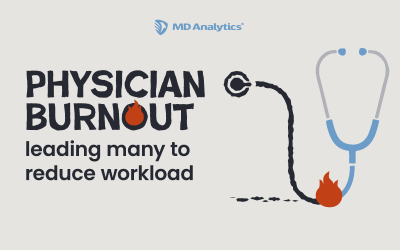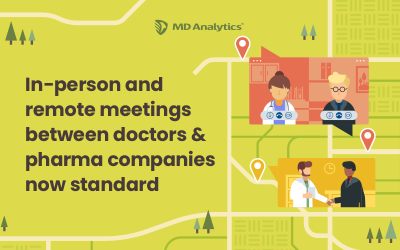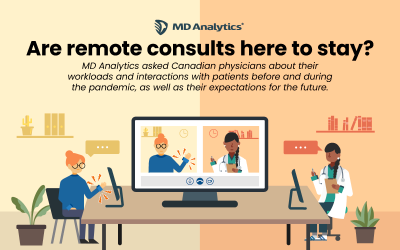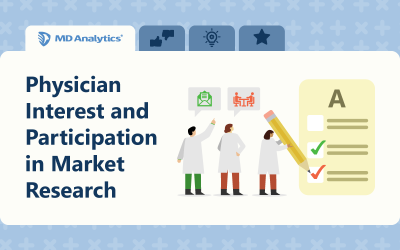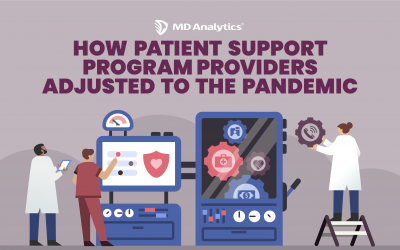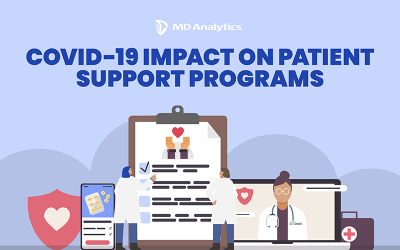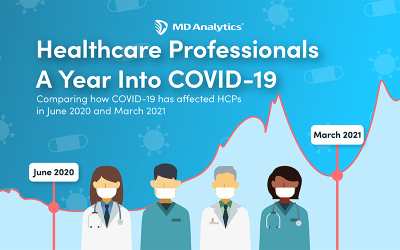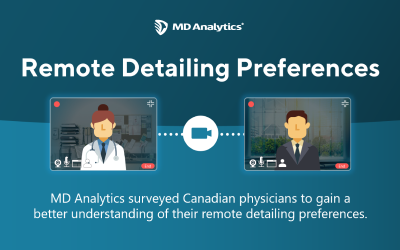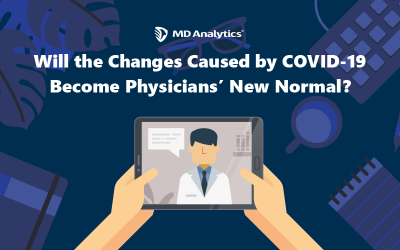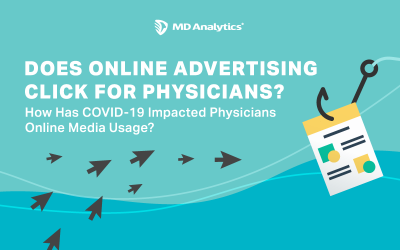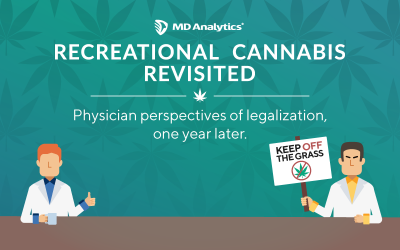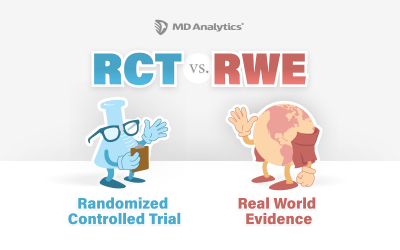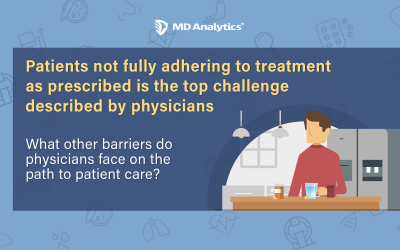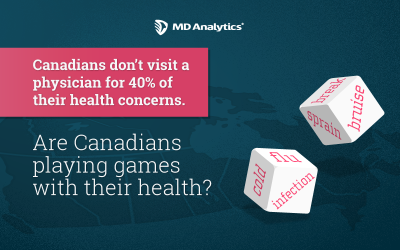For most of the general population, the pandemic is starting to feel like it’s a thing of the past. However, while most of us have found a sense of normalcy within our lives, the healthcare system is still reeling from its effects thereby impacting healthcare workers within it. What is the impact on Canadian physicians? What are the current consequences of the pandemic on their personal and professional lives? More specifically, how does this all impact the management of their workload? MD Analytics surveyed 50 family medicine physicians and 90 specialists on the topic of their professional and mental state 3 years after the onset of the pandemic.
Survey Data
MD Analytics conducts surveys with our healthcare professionals panel on topical issues that you may find interesting. We post our results publicly on our website and share them with our panel members in newsletters. Our survey data is visually displayed in an accompanying infographic that you may share with attribution.
Celebrating 20 years of MD Analytics!
We are sometimes reminded with stories, movies and books that companies have an origin too. It must have started somehow. Someone must have had a vision or an idea and then worked hard to get it going.
MD Analytics is no different in this way and its story follows its own certain path with many team members supporting the company’s growth and quality deliverables throughout the years. At the forefront is the CEO, Tyler Hassman, a fourth generation Canadian, born in Saskatchewan who migrated to British Columbia in the late 90’s; where he held several sales positions during the “dot com” days and met other ambitious soon-to-be entrepreneurs along the way. Working long hours tirelessly and then meeting with friends after work to talk about business was the way he spent most of his days. Day after day, year after year working and evolving along with the business.
In-person and remote meetings between doctors & pharma companies now standard
Since its initial onset, COVID-19 has had a significant impact on how physicians interact with pharmaceutical companies. Government restrictions forced companies to quickly adapt and move to more remote forms of interactions. While in-person interactions are once again a viable option for communication, will they return to pre-pandemic levels? MD Analytics has been monitoring these trends over the past few years and we have recently interviewed 50 Canadian GPs and 90 Canadian specialists in our latest survey on the topic.
Are remote consults here to stay?
With COVID-19 about to enter its 3rd year, it continues to significantly impact the lives of Canadians and the practices of HCPs in the country. Even though it has not been easy, physicians have continuously adapted how they manage their patients and how they interact with key healthcare stakeholders during the pandemic. MD Analytics has been monitoring these trends over the past few years and we have recently interviewed 140 physicians in our latest survey on the topic.
Physician Interest and Participation in Market Research
Market research plays a fundamental role in helping those involved in the healthcare market answer key questions about their brands. Gaining insights from healthcare practitioners is central to market research. However, engaging physicians to participate in research can be a challenge. While most of the surveyed physicians say they enjoy participating in market research studies, in practice, physicians self-report participating in less than half of the number of studies they are invited to participate in. Real-world experience from our panel says the response rate is even lower. With this in mind, we asked Canadian physicians to help us understand what motivates them to do market research.
Discover How Physicians Want to Learn About New Treatments
Engaging prescribers is a key component to the launch of any new brand. But what are the key components that drive interest for physicians in learning more?
Overall, physicians express greater satisfaction when learning about new products through in person interactions compared to virtual or digital interactions. However, regardless of how they learn about new product, the types of resources physicians prefer are similar. The top most preferred resources for both GPs and Specialists include presentation at conferences, discussions with peers, educational events that include KOLs or treatment areas experts, presentations by lead authors, journal clubs and discussions with Pharmaceutical reps. While a majority agree (66%) they are more likely to engage with reps or MSLs to discuss new products or indications, more physicians agree (87%) they are more likely to meet with a rep or MSL with whom they have an established relationship.
Understanding the Impact of COVID-19 on New Pharma Product Launches
The COVID-19 pandemic had a significant impact on physicians, including how they learn about and integrate new products into their practice. While not all saw a decline, close to 1 in 3 Specialists and close to half of GPs say their use of newly launched products declined during the pandemic, primarily due to a lack of pharma presence, reduced patient volumes overall and just a general lack of comfort using new products.
How Patient Support Program Providers Adjusted To The Pandemic
Physicians feel positive about how Patient Support Programs (PSPs) have evolved in the past two years – especially in terms of responsiveness and the expertise of individuals working on PSPs. The main unmet needs at this time remain the range of service hours and the availabilityof nurses remotely (either by phone or virtually). Many specialists believe that biosimilar PSP providers have struggled more than originator drug PSPs since the onset of the pandemic – mainly because of they do not have as many employees and offer a smaller range of services.
COVID-19 Impact on Patient Support Programs
Patient Support Programs (PSPs) play a significant role in ensuring that patients have the best possible experience during their journey – especially in specialty therapeutic areas where treatments tend to be more expensive. The COVID-19 pandemic has made it more challenging for patients to access support and services for their medical conditions. This has put additional pressure on company-sponsored PSPs to further enhance their offerings to help patients in the best way possible. PSPs have become increasingly important for patients since the onset of the COVID-19 pandemic and as a result now have an even more significant influence on physicians’ treatment selection process.
Pandemic’s Impact on HCPs Practices and Vaccination Campaign Perceptions
The COVID-19 vaccination campaign is underway in Canada. However, the pandemic has significantly altered HCPs’ practices to date. These changes have impacted workloads, patient assessments, and interactions with pharma. A year into the pandemic, a national COVID-19 vaccination campaign is underway. This begs the question, how are Canadian HCPs doing today? What do they foresee moving forward? Our latest short survey presents the current state of HCPs’ practices in Canada and their assessment of the government’s management of COVID-19.
Virtual Medical Conferences – Promoting your brand to a digital audience
Virtual medical conferences are on the rise, but are they here to stay?
As a result of the pandemic over the past year, conference organizers and medical brands were set scrambling to find a solution to limit cancelations of key medical conferences. Resulting virtual platforms advanced quickly to emulate the face-to-face conference experience through a digital means. While many virtual medical conferences were successful, in terms of strong participation levels to many key events both national and international, questions remained as to how well they met the needs of physicians, other healthcare providers and the pharmaceutical and medical device companies sponsoring these events.
Remote Detailing for Pharma – Physicians’ perspectives
Our 5-minute online survey conducted in the fall of 2020 sought to gain clarity around remote detailing. This study was conducted with 339 Canadian physicians who are members of the MD Analytics healthcare panel and the results provide actionable recommendations on how to form a more ‘ideal’ pharma remote detail.
Will the Impact of COVID-19 on Physicians’ Practices Become the New Normal?
The COVID-19 crisis has significantly impacted physicians’ practices; but how and to what extent? Physicians have been managing significant workloads, while learning on the fly how to navigate and setup virtual meetings. Maintaining high levels of patient care while minimizing in-person interactions has also been challenging.
Does Online Advertising Click for Physicians?
Strong online advertising and messaging are key to maximizing impact of any marketing campaign. With recent restrictions on in-person interactions, online advertising and messaging play an even greater role in reaching physicians. Our findings from a survey of n=227 Canadian physicians show that 82% of Canadian physicians have increased their use of online platforms as a result of COVID-19, 48% significantly so.
Physicians’ Perspectives on Cannabis Legalization – One year later
In October 2018, the use of recreational cannabis was legalized across Canada. Looking back at the past year, physicians remain divided in their views towards this new legislation, though support skews towards younger GPs. This legislation has impacted the use of prescription treatments and patient visits in a number of key therapeutic areas, though not to the degree that was anticipated 12 months ago.
Real World Evidence – Does it influence prescribing decisions?
Real World Evidence (RWE) is a growing area of research that, pivoting from the rigorously controlled standards of randomized controlled trials (RCT), is based on a model driven by real world patient data. Real World Evidence stems primarily from an observational analysis of a sample in a less controlled environment. Focused on the efficacy and outcomes of therapies in a real world setting, RWE provides a unique lens not attainable from traditional clinical trial research.
Physicians’ Perspectives on Pitfalls in the Patient Journey
In the healthcare system, a patient’s journey to optimal care presents many obstacles. There are numerous steps involved from the onset of a medical condition to the moment when satisfactory results are achieved. This healthcare survey seeks to reveal key opportunities within the patient journey that would assist patients along their way and ultimately improve outcomes. Further healthcare market research could also be conducted by disease area to dig deeper into these insights.
Are Canadians Taking Unnecessary Risks with Their Health?
Over a 3-day period, MD Analytics surveyed 1,000 Canadians that are responsible for making health-related decisions. It was found that respondents are often choosing to not to see a physician when health-related scenarios arise, citing self-diagnosis or lack of convenience as their key reasons. Respondents are also strongly likely to visit a walk-in clinic instead of their family physician, with convenience again mentioned as the key reason.
